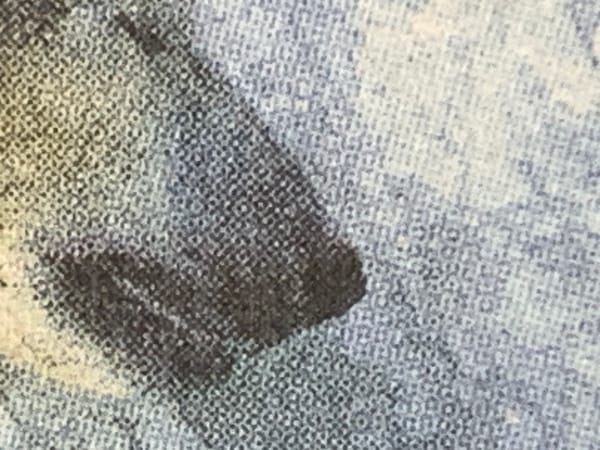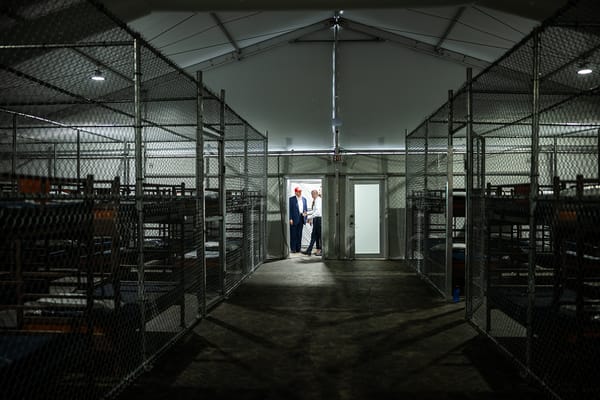JOIN US


The Best Email We Wrote This Past Weekend
Good morning! We are writing to you because days or weeks or months ago, you told us that you would like to receive more information about a publication named Hmm Daily. We definitely should have written to you sooner than this. This email ("newsletter"?) format is a new one to us. We weren't quite sure what to put in it. We still aren't, but we won't figure it out if we don't try.
So here is the inaugural edition of Hmm Weekly, the weekly email publication of Hmm Daily. (Future editions will be less like this extended business message we're doing now and more like the rest of it.) If you're reading this because someone forwarded this to you, you can sign up for a copy of your own at the bottom of our home page here.
Our mission for Hmm Daily is to create and maintain a new and different place for people to write, or a place for new and different people to write, or a place for people to write (and read) new and different things. It is to try to get outside the established conversation and make sense of it.
Less idealistically, or exactly as idealistically, our mission is also to try not to run out of money as we do this. Hmm Weekly—and the paid membership that goes with Hmm Weekly—is a means to that end, an extra something to give you, the readers, as we ask for an extra something, beyond your thoughtful attention, in return. (Money.) And then, as the schedule of rewards lower down shows, we give you something in return for that, in a reciprocating display of appreciation.
On the classic internet-publishing-business-model flow chart, we have been in Phase One:
Publish stories online -> [????] -> $$$
We began publishing articles in late September. If you haven't been reading them yet, please do. Some of the bigger or more complicated ones are collected here. The smallest and least complicated ones are here. The crankier ones are here and here.
What goes inside those brackets in Phase Two? You will, we hope. Not some approximate model of "you," based on surveillance data, to be sold to marketing companies. But you, personally, the reader, reading things and exchanging some amount of money for that reading experience.
Skip this next paragraph if you don't care about the blockchain:
Wasn't there going to be something about the blockchain? Yes. We are part of the Civil network, supported (for now, and the next few months) by a startup grant from the Civil Foundation, and the Civil network's goal is to build a token-based system of governance, in which the general public can use cryptocurrency to support the journalism they want to read. If that sounds forbiddingly abstruse, well, it was, and the first attempt to sell the tokens turned out to be too difficult. A revised and simplified token sale is still in the works. Last month, we finally began using the plugin that can inscribe the stories we publish onto a permanent, undeletable distributed ledger.
OK! Whatever specific futuristic mechanisms may or may not eventually come into play, there remains the not-at-all-resolved tension in online publishing between trying to reach as many readers as possible and trying to convince those readers to invest in what they're reading.
One solution to this is the paywall, by which a publication keeps readers from reading beyond a certain point unless they come across with the money. Paywalls can be effective, but we're trying to see if we can get by without one. Because one of our goals, as we mentioned, is to give writers a platform for pieces they might not otherwise have the chance to publish, we'd prefer not to throw ourselves between those writers and their potential audience, if we can help it. But we would also like to make sure we have enough money to offer the writers for their writing.
So we are asking you, the readers of Hmm Daily, to become members of Hmm Daily, at whatever level of contribution suits you. The website will be there for you to read, regardless, but with every membership comes a subscription to Hmm Weekly, delivered every Tuesday to your email inboxes. To commemorate our healthy and mutually rewarding relationship with our readers, we are offering a multi-tiered system of Hmm Daily goods and tchotchkes. Don't be afraid to dream big!
Our membership options, which you can choose and activate by going here, are as follows
Monthly Memberships
- $5/mo. : Supporter - our GRATITUDE
- $10/mo. : Monthly Member - our GRATITUDE and a HMM DAILY BUTTON
- $25/mo. : Monthly Member Deluxe - our GRATITUDE, a HMM DAILY BUTTON, STICKER, and WOODEN NICKEL
Annual
- $100/yr. : Member - a HMM DAILY BUTTON, STICKER, and WOODEN NICKEL
- $250/yr. : Member Deluxe - MEMBER BENEFITS plus a PAIR OF DICE in HMM DAILY COLORS and ONE WORD MAILED TO YOU ON A PICTURE POSTCARD
- $500/yr. : Patron - MEMBER BENEFITS plus a PAIR OF DICE in HMM DAILY COLORS, YOUR NAME ON OUR PATRONS PAGE, and ONE WORD MAILED TO YOU ON A PICTURE POSTCARD EACH MONTH
- $1,000/yr : Colossal Patron - PATRON BENEFITS plus A SET OF STEAK KNIVES
Lifetime:
- $5,000 : Lifetime Patron - COLOSSAL PATRON BENEFITS plus YOUR NAME IN LITE-BRITE GIF ON OUR PATRONS PAGE
- $10,000 : Royal Patron - LIFETIME PATRON BENEFITS plus OUR TRANSIT BLOGGER, AGE 11, WILL COMPOSE A QUARTET FOR YOU
- $50,000 : IMPERIAL PATRON - LIFETIME PATRON BENEFITS plus WE BURY 1,000 MINIATURE TERRA COTTA WARRIORS* IN YOUR NAME AT AN UNDISCLOSED LOCATION
* TERRA COTTA WARRIOR figurines may be in materials other than genuine TERRA COTTA.
Please join us!

POTENT POTABLE
The Retirement Plan
This recipe was born in Baltimore, Maryland, in response to the challenge that sweltering summer heat posed to the enjoyment of a civilized drink, in this case, a Manhattan, while sitting outdoors on the steps of a rowhouse watching the world go by, or as it is known in Baltimore, “stoop settin’. When enjoyed at a civilized pace, a Manhattan in 95-degree heat and Mid-Atlantic humidity becomes warm and heavy, but it’s not a drink to swill rapidly, so the sybaritic solution was a larger vessel and the addition of Pimm’s No. 1, ice, and soda water for a longer lasting experience. When the cold weather hits, the extra ice and volume turn out to provide an easy, unhurried indoor drinking experience as well, with the two ounces of whiskey steadily warming your bones.
- 2 oz. whiskey (doesn’t have to be rye)
- 1/2 oz. Pimm’s No. 1
- 1/2 oz. sweet vermouth
- A dash each of as many of the following bitters as you have handy: cardamom, orange, chocolate, and black walnut. You’ll figure it out.
- Luxardo Maraschino Cherries dripping with their nectar
Pour the ingredients into a large cup, ideally 24 oz, add lots of ice and then drown it all in soda water. Garnish with a dripping cherry or two. Retire to your perch.
(Recipe courtesy of Van Smith, @vansmithwicks on Twitter, proprietor of the Free State Cannablawg, "Keeping an eye on cannabis law in Maryland)
DISPOSSESSIONS
Medusa Lamp
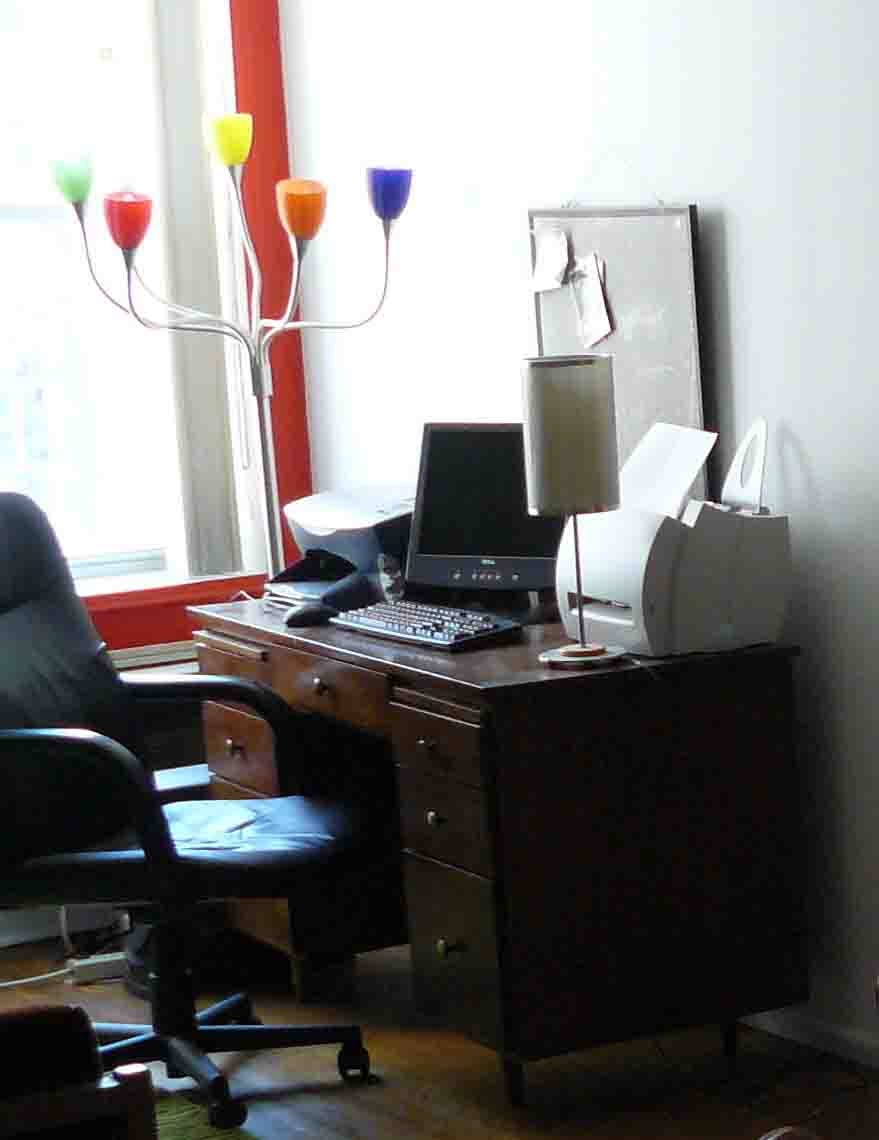
This wasn't the lamp, exactly; the exact lamp was in a lighting store in Rockville, Maryland, where I'd gone looking for a floor lamp for the first apartment the two of us ever had to ourselves. We were in the 20th century then, though not for much longer. I saw that lamp up near the front of the store, when I came looping back around from looking at everything else. I'm not completely sure how many flexible shining steel arms it had, swooping upward, but each one ended in a lily-shaped glass shade of a different color. It was sleek and gorgeous and when I looked at the hanging price tag there was a four-digit number on it, an absurd and impossible number. Still, I couldn't stop thinking about it, and I reported back on it when I got home, just so we knew.
And then, some time later in a furniture store, we found this one, the Medusa lamp. The glass shades were squatter, more tulips than lilies, and the six arms tended to splay more than swoop, but it looked good and it was as close as we were going to get at our pay grades. It was the only one they had, a floor model, marked down to $200 or was it $180? Either way, poor cousin of the fancy one though it might be, it would be the most expensive piece of furniture we owned. We paid up and loaded it in the car and set it up in our below-grade garden apartment, where it put the old halogen torchieres to shame.
It was great. One arm would droop if you bumped it too hard, but it was great. We got married, and we got the lamp packed up and moved when we bought our house, a shingled midcentury three-bedroom in a little pocket of midcentury houses where the lawns all ran together in one continuous lawn. There were neighbors who'd bought new in 1951, social and architectural idealists in the brick-colonial suburbs. Insurance companies had their doubts whether something with that much glass even counted as a real house, back then, someone told us. We set the lamp up in the living room, the living room with the seagrass wallpaper and fireplace and the one glass wall.
Then we got jobs in other cities—two other cities—and sold the house. We put some of our stuff on a boat to China, including the Yamaha electric piano that had taken the new title for most expensive thing in the household, and the rest, with the Medusa lamp, went to a two-bedroom rental apartment in Flushing, Queens. The movers were not the best movers; a spiral rug vanished somewhere between Maryland and Queens, and that must have been a time that one or two of the glass shades on the lamp got broken, too.
They would break again, now and then. I found a place that sold replacement ones online, which was not any place selling sleek grownup modernity but some sort of storefront for stoner decor. It probably lost another one when the lamp and the other household effects moved a few blocks from the Flushing rental to a junior 4 we'd bought in a co-op, a big utilitarian brick apartment building. There were gratings on the windows and a view of parking lots. The lamp stood by the desk in the living room, but we were mostly living in China, where we had become a family of three.
We kept moving, and the lamp kept moving: back down to Silver Spring from Flushing, to meet up with all the household goods returning from China in a now-overstuffed two-bedroom. From Silver Spring up to Manhattan, the West 60s; we'd sold off the co-op and were wholly renters again, in a 19th-floor apartment with a temporary wall to turn the dining nook into the preschooler's bedroom. The lamp shone beside the armchair where our second son nursed or got his bottle, next to the bedroom doorway. Things were a little congested there, and it got knocked over. The spread of the arms made it a little top-heavy. At some point we'd broken the one of the shades that was pale sea-green, like the green of the plates we got from Target for our wedding, and the stoner shop only had a dark emerald option as a replacement.
We moved again, barely, three blocks up and one block over and one floor down, to get an actual bedroom for the children. It was a new mirrored-glass building, looking to fill its vacant units with discounted rents that wouldn't last. Walking home at night down the avenue, at a certain angle I could see the colored lamp shades in the glass-on-glass corner of the living room, just sticking out into view from behind the neighbors' larger apartment.
One day I found myself riding in the elevator with a famous television personality, and when the lease came up for renewal, the discount was over. Across the avenue was a building that had a little more space for a lot less money. We hadn't finished unpacking and rearranging the furniture when one of the boys knocked into the Medusa lamp and it went over, much harder than it ever had before. Four of the six globes were shattered.
The boy felt bad about it, but the truth was, the lamp's stability wasn't what it used to be. It had been shedding crumbling bits from the underside of the base for years now, while we pretended it wasn't, and now it was leaking sandy ballast. We'd been shedding books and bookcases and other furniture through the years and the moves, but the kids had been drawing more things to them at the same time. With four people in a two-bedroom, there wasn't any place to shelter and protect the Medusa lamp in its infirmity. We weren't capable of having that lamp in our lives anymore. I dragged it to the trash room and left it there.
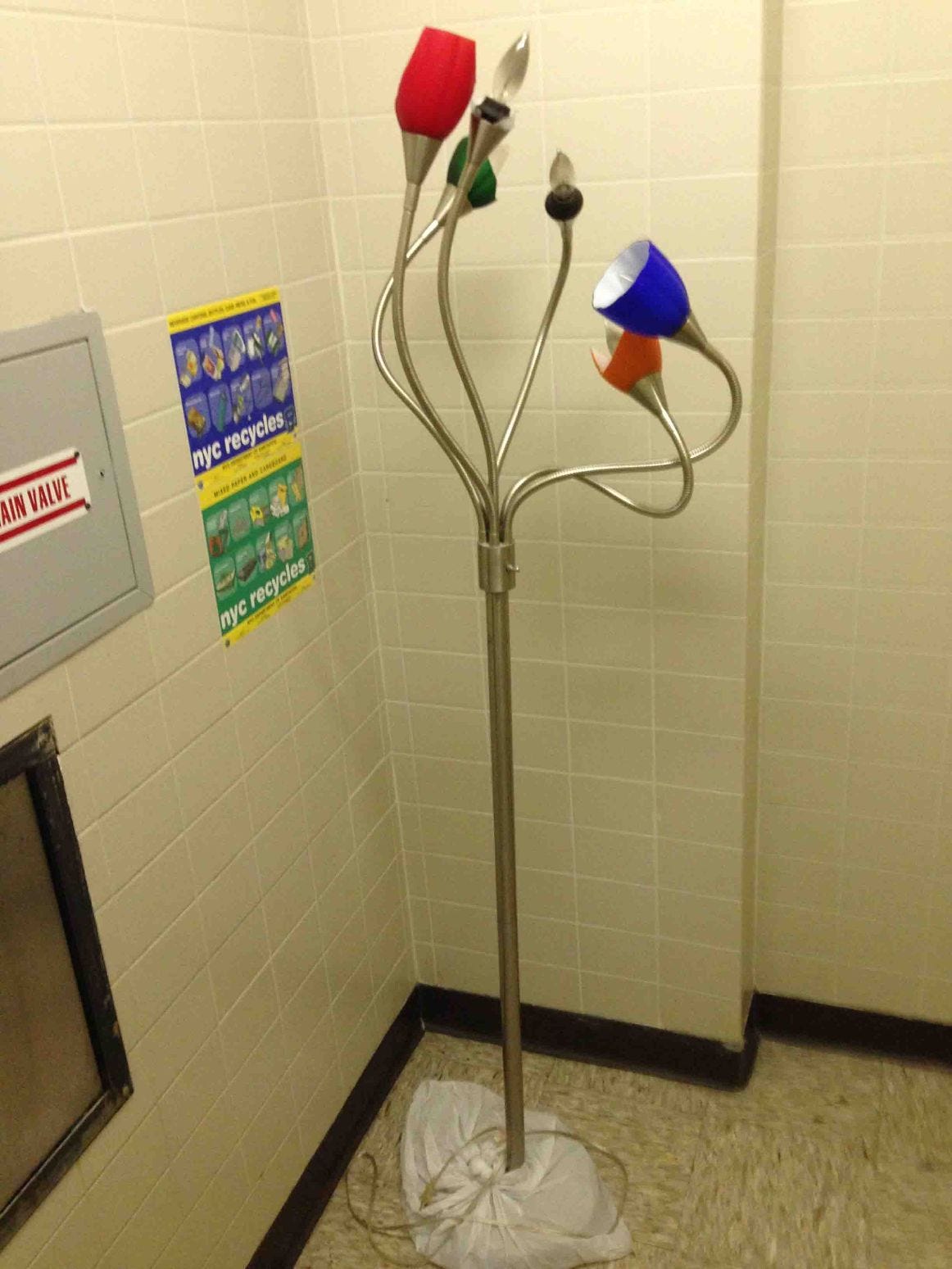
Nineteen Folktales: A Series
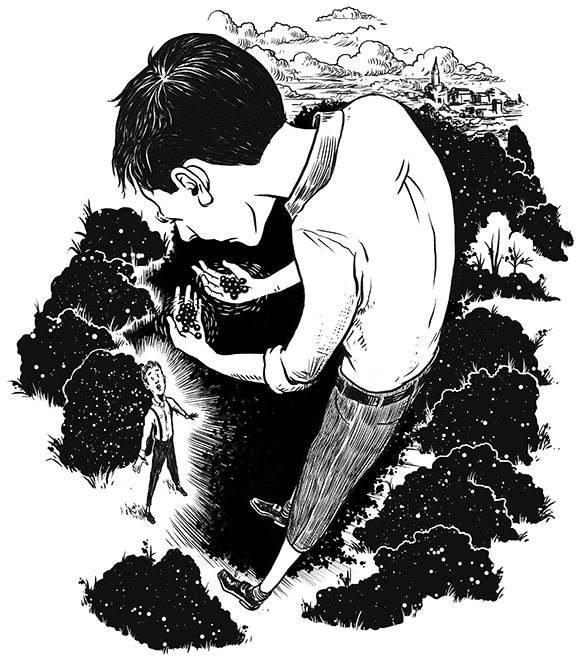
[Illustration by Jim Cooke]
1. The Berries
Two boys went out into the woods to look for berries. In a clearing, they found an abundance of blueberries on low bushes, and on another bush, somewhat taller, a cluster of unusual silver berries. "I should like to try these," said one boy to the other. He was himself a little bit the taller of the two, though few people who knew them bothered to make such a distinction.
"Not I," said the shorter boy. "I am fond of blueberries, and these blueberries are more than enough for me."
"Besides," he added. "Those other berries look peculiar."
The taller boy could not dispute this point, so he chose to ignore it. Reaching up into the bush, he grasped the gleaming silver berries, and they came away easily in his hand. He gave them a quick sniff, finding their aroma neither alarming nor intriguing, and popped them into his mouth. They were juicy and somewhat sweet, though less sweet than blueberries would have been. Something about them tasted almost like pine oil.
"These blueberries are delicious," the other boy said, munching on his third or fourth handful. "How were those other ones?"
The boy who had eaten the silver berries grabbed some blueberries of his own. He had not chosen the silver berries exclusively, after all. But his heart was not in it. "They were fine," he said.
When both had eaten their fill, they headed back toward their homes. As he walked, the taller boy felt a sudden coolness about his ankles. He looked down and saw to his surprise that his trouser cuffs had ridden halfway up his shins. His shirt cuffs, too, were seemingly in retreat.
"What has become of me?" he asked, and his voice sounded unfamiliarly deep. His friend looked up at him, and now his friend did have to look up, because there was a full head's worth of difference between them.
"You're growing bigger, and that's a fact," the smaller boy, now much the smaller, said. And indeed by the time they made their way out of the forest, the larger boy was nearly twice the size of his friend. Over the course of the next few days, he continued to grow until he was three times the size of the man who had previously been the largest in their village (and who was now discomfited by his demotion to second-largest).
At that point, he ceased his growth. The village tailor, in a gesture of sympathy and respect, depleted his stores of linen and canvas to sew him two suitably voluminous suits of clothing, at no charge. The cobbler, borrowing a sledgehammer from the blacksmith, made him an immense pair of boots.
"I will go now and seek my fortune in the world," said the boy, who was now the young giant. "Wish me luck." His friend wished him luck, and they parted.
With his tremendous size, and what turned out to be strength to match, the young giant made a positive impression as he made his way through the countryside, besting local strongmen and solving intractable challenges. Eventually his fame reached the city, and the ruling prince sent for him and offered to make him a captain of the guard. With the young giant at the fore, the city's troops subdued all their regional rivals and became a watchword for heroism and potency at arms.
The other boy, meanwhile, continued to gather blueberries, year after year, eating all he could on the spot and carrying home basketsfull of the rest to make jam. Such jam as he couldn't eat himself in the winters, he sold, and lived comfortably on the proceeds as he grew to adulthood. His jam was regarded as the finest jam in several villages.
The giant--a young giant no more--bedded down each night in his own room off the barracks, or in an airy custom-made tent out in the field. His mattress was stuffed with countless yards of the finest horsehair. His overblanket was the shaggy pelts of four tremendous lions that he had slain with his own powerful hands. Trophies of battle were arrayed on the walls. His own name, sung by the minstrels, rung in his ears. All that he was conscious of, however, in the darkness, was a hunger for blueberry jam.
***
HMM WEEKLY is delivered every Tuesday to HMM DAILY supporters, members, and patrons



